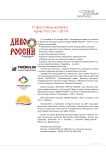Статьи журнала - Сервис в России и за рубежом
Все статьи: 2152
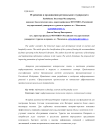
IT-решения в продвижении регионального турпродукта
Статья научная
Авторами рассматриваются исторические этапы и тенденции развития информационных технологий в туризме и гостиничном секторе. Представлена классификация систем бронирования средств размещения, функционирующих в Российской Федерации. Приводится опыт разработки и внедрения информационных решений в регионе. Сформулированы предложения по повышению эффективности продвижения регионального турпродукта
Бесплатно
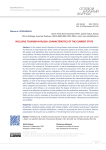
Inclusive tourism in Russia: characteristics of the current state
Статья научная
In the modern world, attention to the problems and interests of people with disabilities has become an important part of the social and economic policies of various states. In everyday life, people with disabilities face numerous barriers related to access to infrastructure, services, and products. All these obstacles prevent them from being active members of society. Inclusive tourism should be considered one of the promising areas for improving the quality of life, social and psychological adaptation and rehabilitation, providing full-fledged recreation for disabled people and people with disabilities. The relevance of the research topic is confirmed by the analysis of the latest statistical data on the number of disabled people in the world and the Russian Federation. The concept of "inclusive tourism" is not an unambiguous question, which is proved by the presence of many definitions and a number of synonymous terms that are given in the article. The author identifies various categories of the low-mobility population and people with disabilities who need barrier-free tourism services and an accessible environment. The most important factor in the development of any direction in tourism is the level and content of its regulatory and legal regulation. In this regard, the article examines the international legal aspects of liability, as well as the Russian legislative framework for the observance of the rights of persons with disabilities and regulatory documents defining the specifics of the provision of services to these categories of consumers. The analysis of publication activity on the topic of inclusive tourism is given, which allows us to conclude about the degree of interest in it in the scientific community as a reflection of attention to this problem from the authorities and society. The analysis of the current situation of the development of inclusive tourism in the Russian Federation highlights positive results, examples of successful practices and business ideas. The main problems and obstacles in this process are formulated: the lack of information, infrastructure and financial accessibility.
Бесплатно
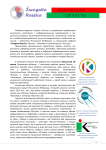
Incognita Rossica: Калужская Область
Статья
Редакция журнала «Сервис в России и за рубежом» продолжает знакомить читателей с информационными материалами о туристских ресурсах, достопримечательностях, актуальных событиях и особенностях развития услуг гостеприимства в отдельных регионах - субъектах Российской Федерации в специальной рубрике «Incognita Rossica» (Rossica - буквально «относящееся к России»). Приглашаем региональные туристские органы власти, туристские информационные центры, краеведов, идеологов развития туризма в регионах присылать в редакцию информационные материалы для этой рубрики. Давайте вместе раскрывать туристский потенциал нашей страны, изучать и исследовать Incognita Rossica!
Бесплатно
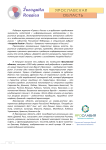
Incognita rossica: Ярославская область
Статья обзорная
Редакция журнала «Сервис в России и за рубежом» продолжает знакомить читателей с информационными материалами о туристских ресурсах, достопримечательностях, актуальных событиях и особенностях развития услуг гостеприимства в отдельных регионах – субъектах Российской Федерации в специальной рубрике «Incognita Rossica» (Rossica – буквально «относящееся к России»). Приглашаем региональные туристские органы власти, туристские информационные центры, краеведов, идеологов развития туризма в регионах присылать в редакцию информационные материалы для этой рубрики. Давайте вместе раскрывать туристский потенциал нашей страны, изучать и исследовать Incognita Rossica! В текущем выпуске эту рубрику мы посвящаем Ярославской области, которая в 2018 году провела свой ребрендинг и представила новый туристский лого-бренд «Ярославия – среднерусская Гардарика». В основу идеи нового бренда легла территориальная структура региона. Термин «Гардарика» хорошо узнаваем за рубежом. Именно так называли Древнюю Русь ее европейские соседи. Он заключает в себе определенный культурный код, который формирует у туристов четкие ожидания от территории. Ярославия – это «страна городов», уникальный конгломерат 12 старинных городов: Гаврилов-Ям, Данилов, Любим, Мышкин, Переславль-Залесский, Пошехонье, Ростов Великий, Рыбинск, Тутаев, Углич, Ярославль и затопленная Молога. Визуальное воплощение бренда – логотип в виде улыбающегося солнца с 12 лучами. Этот образ основан на внутренних ресурсах региона – ремесленных традициях, природных ландшафтах, духовной и городской архитектуре. Ярославская область расположена на северо-востоке Центрального федерального округа Российской Федерации. Площадь региона составляет 36,17 тыс. км2, что больше таких стран, как Кипр, Словения, Сингапур, Мальта, Израиль, Македония, Албания, Черногория, Армения, Бельгия и др. В Ярославскую область едут полюбоваться роскошными храмами Древней Руси, послушать звон старинных колоколов Ростова, купить украшение, выполненное в древней ювелирной технике финифть, и сфотографироваться с тысячей рублей на фоне памятника Ярославу Мудрому, изображенного на этой купюре. Об этом – нижеследующие материалы.
Бесплатно
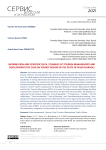
Статья научная
Information and scientific data are part of the tourism management and development process. However, the management of a tourist destination depends on integrated tourism policies. This study explains the existing dichotomies in planning and managing tourist destinations, specifically in raising information and data for the generation of local, regional, and national tourism knowledge. The research was carried out based on a documental analysis of data published by the Brazilian government and the "COVID-19 Business Survey of Impacts on the Tourism Industry in Brazil" report conducted by the Brazilian Network of Tourism Observatories (RBOT) and the Piauí Tourism Observatory (OTPi). As a result, the study presents eight findings identified in government research in Brazil, and the tourist territory Polo Costa do Delta. The findings corresponded to the analysis categories "Lack of Specificity," "Transparency," "Update," "Lack of skilled labor," "Poor coordination," "Lack of Planning," and "Centralized decision-making," elucidated at the national and regional level, dedicated to the tourist region of the State of Piauí. The dichotomies existing in the process of planning and managing tourist destinations in Brazil about getting reliable information and data reinforce the importance of decentralized actions, of the national scope of RBOT, as well as the valorization of regional observatories that contribute to the cooperation, integration, and formation of a smart tourist destination.
Бесплатно
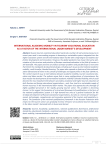
Статья научная
Russian tourism vocational education has faced a number of restructuring measures in recent years and is now making progress in becoming a sustainable system integrated into the higher education system and the international labor market with a high degree of readiness for further development and innovation. However, the global pandemic has shown that some optimization of the structure and priorities of Russian vocational education in the field of tourism is still desirable. This paper presents an analysis of major problems and possible ways to overcome them from the standpoint of educational design, including such issues as international academic mobility, credit transfer, blended learning. The paper also expands on features of internationalization abroad and at home in the context of challenges and opportunities in the post-COVID era. The central research issue is interrelations between academic mobility, tourism vocational education and labor market. The authors argue that in many configurations of circumstances the best way for the development of international academic mobility is blended mobility, which could become the most important link between secondary vocational and higher tourism education of both Russian and foreign educational organizations - and, thus, lead to a sustainable supply of human resources in the international labor market. The paper also approaches the shortage of highly qualified personnel in the rapidly growing tourism sector. This problem is becoming chronic. In this regard, the formation of a structured framework of qualifications in the form of the national qualifications system is in high demand not only as a general institution for the strategic development of Russian educational organizations, but also as a means of training personnel, technologies, competencies and innovative potential of the tourism and hospitality industry. The formation of the national qualifications framework in the Russian Federation with respect to the tourism sector can gradually increase relevance of vocational tourism education to the labor market’s demands both in Russia and abroad.
Бесплатно
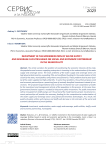
Статья научная
The article considers the problem of coordinating the economic interests of the state, the population and resource-supplying enterprises in investing in the modernization of the water supply and sewerage sector. The main problems of the water supply and sewerage sector are high physical deterioration, exceeding 70%, and insufficient funding for the modernization of this sector by the state, municipalities and private concessionaires. These problems lead to poor quality of the water supplied and high utility bills. To solve these problems, the authors propose social and economic partnership as a promising form of mutually beneficial investment instead of concessions. The proposed organizational and economic mechanism for such cooperation provides for the investment and management activity of the population in this process. At the same time, government financial support is needed for long-term public investment. The public investment will be recouped from tariff savings over the period of the modernization project. Social and economic partnership will provide the necessary funding for the comprehensive modernization of the water supply and sewerage sector using advanced trenchless technologies. As a result, the quality of public utilities will improve and tariffs will decrease in the interests of the social and economic development of municipalities.
Бесплатно
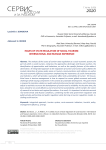
Issues of state regulation of social tourism: international and Russian experience
Статья научная
The analysis of the issues of tourism state regulation as a socio-economic system, the part of which is social tourism, comprises the approaches of foreign and Russian authors, the identification of opportunities and limitations, as well as the specific features of the author's observation. An integrated approach to the regulation of tourism and tourism policy defines the mutual interaction of various policy areas on tourism, communications and relations, as well as the socio-economic efficiency assessment emphasizing the importance of social characteristics and indicators, which will provide a synergistic effect and sustainability of tourism. The key po-litical issue in tourism management is how to respond to current global economic and social challenges while staying competitive in the context of sustainable development. The government is required to maintain a balance in public administration and market relations, and, if necessary, adjust its activities to ensure the development of tourism and its reliability. At the same time, the focus should be on social efficiency and environmental sustainability, which transfers the vector of research to territories and regional formations. As a result, it is important to take into account real world trends and Russian conditions, combining market and government regulation and public-private partnership and public regulation while forming a tourism regulation model, including social tourism.
Бесплатно
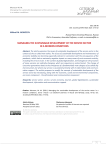
Managing the sustainable development of the service sector in a modern conditions
Статья научная
The article examines the issues of sustainable development of the service sector in the context of the so-called new reality. The issues of sustainable development and maintenance of economic stability are becoming especially relevant in connection with the consequences of the pandemic, which had an extremely negative impact on many areas of socio-economic activity, including the service sector. In the context of global digitalization, technologies for the provision of many services are radically changing, which are acquiring an online format. The change of consumer generations leads to the emergence of a fundamentally new category of so-called digital consumers, for whom any service is associated primarily with its information and communication support. The article proposes to modify the concept of sustainable development of the service sector by introducing, along with the economic, social and environmental components, one more component - the information and communication component.
Бесплатно
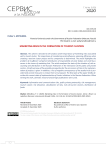
Marketing risks in the formation of tourist clusters
Статья научная
This article is devoted to the analysis of the importance of marketing risks associated with a tourist cluster. The importance of considering social influences, planning efficiency when creating a tourism cluster project and its components is determined. The article highlights the problem of insufficient competent distribution of responsibility of state bodies and small busi-nesses in the issues of marketing lists. The article analyzes the state of the situation of risk ac-counting and distribution in the Russian Federation in the interaction of the public and private sectors. A brief overview of the possible prerequisites for the occurrence of risks in the implemen-tation of projects is given. In addition, a list of negative consequences of the studied risks is provided and several measures to reduce them are proposed. The final part of the paper briefly describes the current state of implementation of cluster initiatives in the Russian Federation. When writing the work, domestic research and foreign publications were used.
Бесплатно
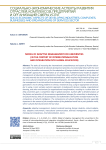
Статья научная
The tasks of increasing the international competitiveness and export of Russian education within the framework of national development priorities are inextricably linked with the need to create a favorable environment for the adaptation of foreign students based on ecosystem and stakeholder approaches. The formation of an integral and multidimensional model of adaptive management of educational organizations should take place with full recognition of the values of not only external, but also internal internationalization, which requires the formation of long-term key cross-cultural competencies of all levels of employees. An important difference between adaptive management in an intercultural environment and change management in a monocultural organization is not in solving problems in a linear, mechanistic way, using an appropriate set of tools, but in using a more complex systemic approach, including joint decision-making, organizational learning, and other mechanisms for organizational transformation, resulting in a culture that can help universities gain a competitive edge in global education. Authors offer a detailed analysis of the factors and priorities of the necessary organizational changes for universities in developing intercultural literacy skills for all participants and stakeholders with further transformation into the competence of cultural intelligence. The competencies of cultural intelligence become especially important in the context of the transformation of the globalized world into a post-globalist world, where cultural diversity becomes the key value.
Бесплатно
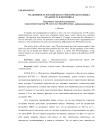
PR-активность российского туристического рынка: реальность и потенциал
Статья научная
В статье рассматриваются вопросы о том, для чего специалисты по PR нужны туристическому рынку, какие цели ставятся перед ними, какие задачи они способны решать. На примере двух туристских объектов (г. Суздаля и сети отелей «Хилтон») в России показано, как сейчас на практике используются PR-технологии в туристическом бизнесе и что необходимо сделать для повышения эффективности PR-деятельности
Бесплатно
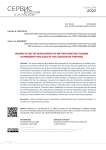
Статья научная
The article analyzes the problems and prospects for the development of military heritage tourism with the evidence from Primorsky Krai. The study notes the significance of military heritage tourism in Russia, due to the rich historical heritage the country possesses. There is general trend for restoration, as well as for adaptation of military heritage sites for tourist purposes. Former fortress complexes, memorials, other structures are being restored, museumified, used as popular tourist sites. Similarly, the number of relevant festivals, events is growing. At the same time, the analysis shows that in relation to these realities, Primorsky Krai can be recognized as the region that has the necessary resources and opportunities for the further development of military heritage programs. The dominant resource is the Vladivostok Fortress, tourist potential of which is just beginning to develop, however, it already allows using various methods, forms of creating a tourist product. Thematic events, exhibitions, excursions, covering not only the ground part of the fortification, but underground components as well are developing today, taking advantage of demand from the local population and foreign tourists. At the same time, during the analysis, certain problems were also identified, and the ways to solve them were proposed.
Бесплатно
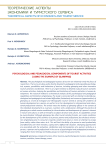
Psychological and pedagogical components of tourist activities (using the example of glamping)
Статья научная
The psychological and pedagogical aspects of tourism are relatively rarely the focus of researchers. There are very few works directly devoted to pedagogical and especially psycholog-ical, aspects, possibilities and limitations of tourism, including glamping and other innovative tourism practices and formats. There is an urgent need for a detailed study of tourism activities as human activities, studying the possibilities and limitations of tourism activities in human de-velopment. The research method is a theoretical analysis of the psychological and pedagogical capabilities and limitations of glamping. The study is connected with an attempt to identify psy-chological and pedagogical and related difficulties (limitations) and resources (opportunities) of glamping as a kind of ecological and ethnographic tourism aimed at solving the problems of human development as a person, as well as his or her development in interpersonal and educa-tional-professional relations. The article notes the duality of glamping effects in the context of the individual development as a person, a partner and a professional. Although the practice of glamping as a whole creates conditions for the activation and development of a person's interest in nature and culture, as well as himself as a subject of nature and culture, its capabilities cannot be overestimated. Although glamping, like other tourist activity formats, can create conditions for the development of his activities as a person, partner and professional, but the basic orienta-tion of glamping and its consumers towards comfort and luxury is more an attempt to escape from reality, rather than return to it. This will limit the ability of a person to work productively and effectively over their mistakes, coping with a difficult life situation. Glamping opportunities are associated with the activation, clarification and harmonization of a person's activity as a person, a partner and a professional in the course of psychological and pedagogical procedures, ranging from home therapy and hobby groups to travel therapy and events.
Бесплатно
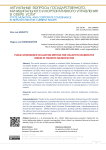
Public governance evaluation method for collective deliberative bodies in touristic municipalities
Статья научная
This article presents a method to evaluate Public Governance in Collective Deliberative Bodies (CDBs) in touristic municipalities. Despite its multiple interpretations, Touristic Governance consists of many actors, including public management of stakeholders and the institutionalization of CDBs, which requires measuring its degrees of manifestation and operation in tourism. Our approach created an evaluation methodology with the indicators: Cooperation, Coordination, and Collaboration, using CDB governance degrees in touristic cities. Descriptive Statistical Analysis was applied, using the data collected by the actors who participated in these institutions. The presented case study concluded that this proposal involves public and collective issues, shown by Touristic Governance by the Data Collection Instrument (DCI), revealing the constitution and manifestation of Governance in its varying degrees in the tourism context.
Бесплатно
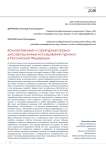
Quantitative and structural analysis of dissertation research of tourism in the Russian Federation
Статья научная
The article gives some experience in carrying out scientometric research of quantity of dissertation research for the PhD degree devoted to the problems of tourism and recreation. The article is focused on dissertation research devoted to tourism, that have been defended in our country beginning from 1980-s. The aim of this scientific study was to define the total number of theses and to determine their division according to scientific areas in Russia. In accordance with this aim the authors focus their attention on the analysis of activity of scientists representing different fields such as economics, pedagogy, sociology and others. The article presents some methods and the results of the author's scientometric study of dissertation activity in the research dealing with tourism and recreation in Russia. The analysis has been carried out in two stages. The first stage of the research (1985-2010) is described in the journal “Regional researches” №2, 2011. The main source of information used at the second stage of this study was Electronic theses catalogue of Higher attestation commission. The theses that have the words “tourism”, “tourist”, “recreation”, excursion”, and “spa” in their titles were regarded as touristic research. As a result, the author revealed 1953 candidate and doctor theses referred to 18 scientific fields. Considering the size of Russia, the obtained results are obviously correlated with foreign experiences described in the article. The table gives absolute and relative number of theses on each field (the percentage of the total number), the data being given on the stages and on the total result. The obvious leaders in the sphere of tourism research turned is economics, pedagogy and geography, and the figure in the article shows this fact very well. The share of these scientific fields accounts for 84, 4 % of all theses, defended in Russia on problems of tourism and recreation. Finally, the author gives their own opinion on such a great popularity of geographic, economic and pedagogical studies in tourism. The obtained results may be used for future planning of new studies in tourism.
Бесплатно
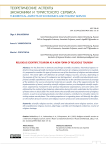
Religious scientific tourism as a new form of religious tourism
Статья научная
For the first time in domestic and foreign scientific circulation, theoretical aspects related to the previously briefly mentioned scientific tourism of a religious orientation are revealed. It is proposed to consider this type of tourism as one of the directions of religious and educational tourism. The article offers the definition of scientific religious tourism, and also, depending on the purpose of the trip, two of its subspecies are distinguished - scientific and educational eventful and scientific expeditionary tourism. It is noted that due to the extremely low level of coverage of the problem, the sources of empirical materials are specific. One of the opportunities for the implementation of travel, caused by scientific religious tourism, are theological scientific conferences organized by monasteries and spiritual educational organizations, and some data were obtained by the method of participatory observation during the visits undertaken by the authors of those events in 2015-2020. The article shows that scientific and educational events of religious content, as well as accompanying books and other products, contribute to stimulate interest in visiting unique sacred places. The existing experience in organizing tours will diversify the offers on the market of tourist services and religious tourism of excursion and educational orientation.
Бесплатно
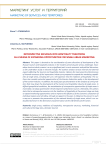
Статья научная
This paper is devoted to the consideration of some directions of development of the Russian tourism and hospitality industry in the modern period of quite serious challenges. Nowadays tourism industry seems is a very significant part in socio-economic and political discussion, so the undertaken study is relevant enough. The authors analyze various internal and external aspects affecting the tourism and hospitality industry. Options for improving the attractiveness of internal resources of the impressions industry are proposed to expand the marketing capabilities of single areas, including the use a retrospective into the traditions of hospitality. The authors also consider potential opportunities of the Russian Federation policy in the development of the tourism industry. In addition, the study pays special attention to the analysis of some problems that slow down the development of the tourism and hospitality industry of single areas. In difficult geopolitical conditions, the actualization of retrospective opportunities of single areas is essentially a strategic potential for the development of domestic tourism. Ultimately, the authors state that a retrospective excursus into the traditions of hospitality at the present stage can help to expand marketing opportunities and to improve the efficiency of the economic component of individual regions and will allow, through an appeal to the past, to influence the present in such a way as to promote the preservation of the national identity of single areas, which is an undoubted dominant in the formation and preservation of the self-identity of the nation.
Бесплатно
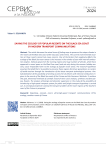
Saving the ecology of popular resorts on the Black Sea coast by modern transport communications
Статья научная
The article discusses the actual issue of finding ways to preserve the unique climate in the resorts of the Black Sea coast of the Caucasus and Crimea. The current environmental situation at these resorts cannot but cause concern. One of the factors that negatively affects the ecology of the Black Sea resort areas is the increase in the number of cars with internal combustion engines. Exhaust gases from the running engines of a huge number of vehicles, which have appeared in recent years on the Black Sea coast (and not only during the summer holiday season), cause irreparable harm to the ecology of popular resort areas. The research hypothesis assumes the belief that it is possible to preserve these regions for future generations as centers of health tourism through the introduction of the latest transport technological systems.
Бесплатно

